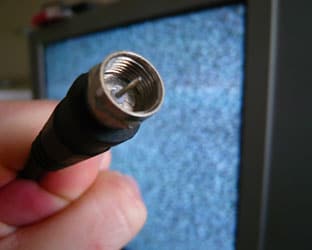The new kid on the communications interest group block is the American Television Alliance, which says it is alarmed about broadcaster’s strong-arm tactics when it comes time to negotiate retransmission fees. NAB found the claim that a group primarily consisting of MVPDs was protecting consumers to be laughable.
ATVA wrote, “The mission of the new coalition, which officially launched today, is to ensure consumers are not harmed — or their favorite shows held hostage — in negotiations for carriage of broadcast programming. The 31-member ATVA coalition will focus on preventing consumer confusion, disruption and ever increasing rates that result from outdated rules governing these carriage negotiations. Under the current law, broadcasters may cut off their television signals and shows from video service providers and consumers if they do not receive the compensation they demand.”
NAB’s Dennis Wharton responded, “The notion that Time Warner and its Big Pay TV allies are part of a group designed ‘to protect consumers’ is about as credible as BP executives joining Greenpeace. Pay TV built its business on the backs of broadcast programming, and it is not unreasonable for local TV stations to expect fair compensation for the most-watched shows on television. The ultimate irony is that Big Pay TV was against government intervention before it was for it, as evidenced by their continued opposition to net neutrality rules.”
NAB noted that according to a study, cable profits rose five times faster than did their programming expenses during a three-year period, and that during the 2009-2010 season, broadcasters provided 302 of the top 312 television programs.
Watchdogs Public Knowledge and Parents Television Council are members of ATVA; otherwise, its 31 members mainly come from the MVPD community, along with a handful of program distributors and other groups. The membership includes American Cable Association, American Public Power Association (APPA), The Africa Channel, AT&T, BendBroadband, Bright House Networks, Cablevision Systems Corp., Charter Communications, DIRECTV, Discovery Communications, DISH Network, GMC, Harron Communications, Independent Telephone and Telecommunications Alliance, Insight Communications Company, Massillon Cable TV, Mediacom Communications, Midcontinent Communications, New America Foundation, National Telecommunications Cooperative Association (NTCA), Organization for the Promotion and Advancement of Small Telecommunications, Companies (OPASTCO), Outdoor Channel, Parents Television Council, Public Knowledge, Retirement Living TV, Rural Independent Competitive Alliance, Sí TV, Starz Entertainment, Suddenlink Communications, Time Warner Cable, USTelecom, Verizon and Wave Broadband and Astound Broadband.
RBR-TVBR observation: ATVA was formed “to give voice to consumer’s interests,” or so it says on their press release. As consumers of MVPD service, we’d be happy if their rates would stabilize, but it hasn’t happened in our lifetime, and we’ve been around for awhile. And statistics prove that broadcast retransmission is not a large factor when it comes to MVPD’s constant rate increases.
ATVA kicks off its campaign by bringing up a situation that hardly ever takes place – only on rare occasions are broadcasters compelled to withdraw their signals in a tough negotiation.
To translate this message, the MVPDs in ATVA want the rules changed so that THEY can use strong-arm tactics to get must-have programming at rates they are better able to dictate. But you can bet your bottom dollar that the MVPDs that also own programming channels don’t want any restrictions placed on their own negotiating power.
The key here is that broadcasters do provide must-have programming that the MVPDs need to sell their service.
From a regulatory standpoint, broadcasters are the ones who provide the most, and often, the only local programming on a given MVPD – all things being equal, the promotion of localism is one of the FCC’s guiding principles and that fact clearly favors the broadcast argument.
An open negotiation on the free market is the best way to arrive at matching the value broadcasters bring to the MVPD to a dollar figure. Despite ATVA’s claims, the system is not broken and does not require fixing.




